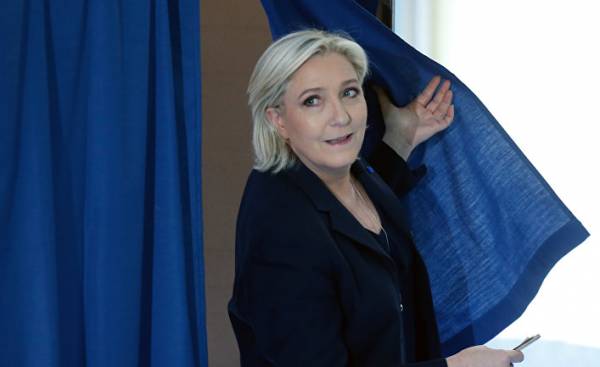
Can marine Le Pen win the election in France, if her opponents would not vote may 7 during the second round? Many potential voters Hillary Clinton, confident in her victory, did not come to the polls last year, which allowed Donald Trump to win the presidential election, and, by analogy, a similar option seems to some extent possible in France. However, there are reasonable grounds to believe that the elections in France are different from elections of the United States and a potential path Le Pen to victory is much narrower than it was at the trump.
The first of these reasons is that the French company conducting public opinion surveys, better have done their work and more accurately predicted the election results than their counterparts in the United States. Many surveys of public opinion, especially in the Midwest where, to the surprise of many, trump won, overestimated the number of supporters of the Democratic party, ready to vote in the election. In France, companies involved in the surveys, with high accuracy predicted the results of the first round, but they underestimated the expected turnout. Only 19 of April of such reputable organizations as Ifop and Cevipof, predicted a 72 per cent voter turnout, but even these data were significantly higher than those of the predictions that were made by them at the end of March, which caused speculation about the fact that Le Pen may get more votes than that indicated by the opinion polls. However, on election day, 78,69% of the French voted at the polls. However, this is not a very high turnout by the standards of the previous nine direct presidential elections of the Fifth Republic. The turnout was lower in only three of them. But still, this is a respectable result, and it corresponds to the previous parameters, that is, there was nothing unexpected, there is no “black Swan.”
Elections in two rounds differ in the dynamics of the elections in one round. The voter who was already involved in the voting process, I am inclined to finish what they had started. Tactical voting is not a painful choice between imperfect alternative candidates due to the lack of a better option — this is the norm, according to which people vote in the first round, in accordance with his conscience. Therefore, in the second and final round of their activity usually increases. There were only two exceptions to this rule — the first direct elections in 1965, in which Charles de Gaulle won a landslide victory over Francois Mitterrand and the election of 1969, when Georges Pompidou defeated Alain Paaru — 58% to 42%. In that year, the supporters of the left parties boycotted the second round; and above all the Communists claimed that there was no difference between two moderate candidates. In addition, the Pompidou advantage in the first round was overwhelming — he received almost twice more votes than the Sharp.
In a sense, this election is a bit like voting in 1969. Frustrated supporters of Jean-Luc Mélenchon (Jean-Luc Melenchon) and Benoit Hamon (Benoit Hamon) among the left equally have little sympathies for the nationalist Le Pen, nor to ex-banker Macron. According to surveys, Marcon has the advantage of 60 — 40 in the second round, and so some people will not be motivated regarding participation in the elections only in order to prevent nationalist and populist threat. It is in the spirit of the similarities mentioned company for the study of public opinion predict fewer voters in the second round — again about 72%. However, it is possible that, as in the first round, they are just wrong, showing some caution.
In addition, the turnout below 70% as it was in 1969, does not provide a Le Pen victory, as evidenced by the analysis of the preferences of voters. The analysis regarding the first round was very accurate — after trump and Breccia. French company to conduct public opinion polls did everything in order to take into account the views of hard-to-reach voters, i.e. young people, older people and rural residents. There is no reason to believe that these models will suddenly collapse in the next ten days.
According to the survey, the results of which were published by Opinion Way on 25 April, most supporters of Fillon, half of the supporters of Mélenchon and three-quarters of the supporters of Amun, expected to vote for the Macron. Although some frustrated voters are saying now that they do not intend to participate in elections, 29% of those people who did not vote in the first round, now I want to vote for the Macron, and for Le pen — 9%.
To win Le Pen, who fell behind Him in the first round by less than 3%, it is necessary to obtain the majority of votes of the strongest supporters of the losing candidates, or to enlist the support of a large majority of “orphaned” voters and some candidates. While there is no indication that this might happen. Given the inflexibility of the platform of Le Pen and her image, she can do little in order to get more votes. The French know who she is and what she stands for. And even the terrorist attack, which could theoretically bring voters to her anti-immigrant views, nothing, apparently, will not change in just a few days before the first round of bombing occurred on Avenue des Champs elysées, which killed one policeman, however, this contributed to the increase in the popularity of the campaign. Of course, the Makron can shoot yourself in the foot, and he already made a mistake by staging a dinner in the La Rotonde restaurant is not a place to dine which would afford the majority of the French voters. But while he seems to not lose their positions — even during a time when Le Pen staged a trap for him at the closing of the Whirlpool factory in Amiens, however, he was able to obtain some support from disgruntled workers. But even if he stumbles — he avoided it during the dirty and tense campaign before the first round is, in the end, it may be in his favor. Recently, the separation of the Makron decreased slightly, although it still remains quite convincing; if this trend will continue over the next few weeks, more opponents, Le Pen will feel the motivation to go to the polls and support an alternative candidate.
In other words, the way Le Pen to the presidency so narrow that her victory belongs to the category of “black Swan”, that is something quite unexpected. The author of this expression Nassim Taleb (Nassim Taleb) States: if the media begin to discuss some incredible events, their probability is often exaggerated. Perhaps this applies to alarmist stories about what a low turnout could lead Le Pen to win.
The authors of this column do not necessarily reflect the views of the editorial Board, Bloomberg LP or its owners.







